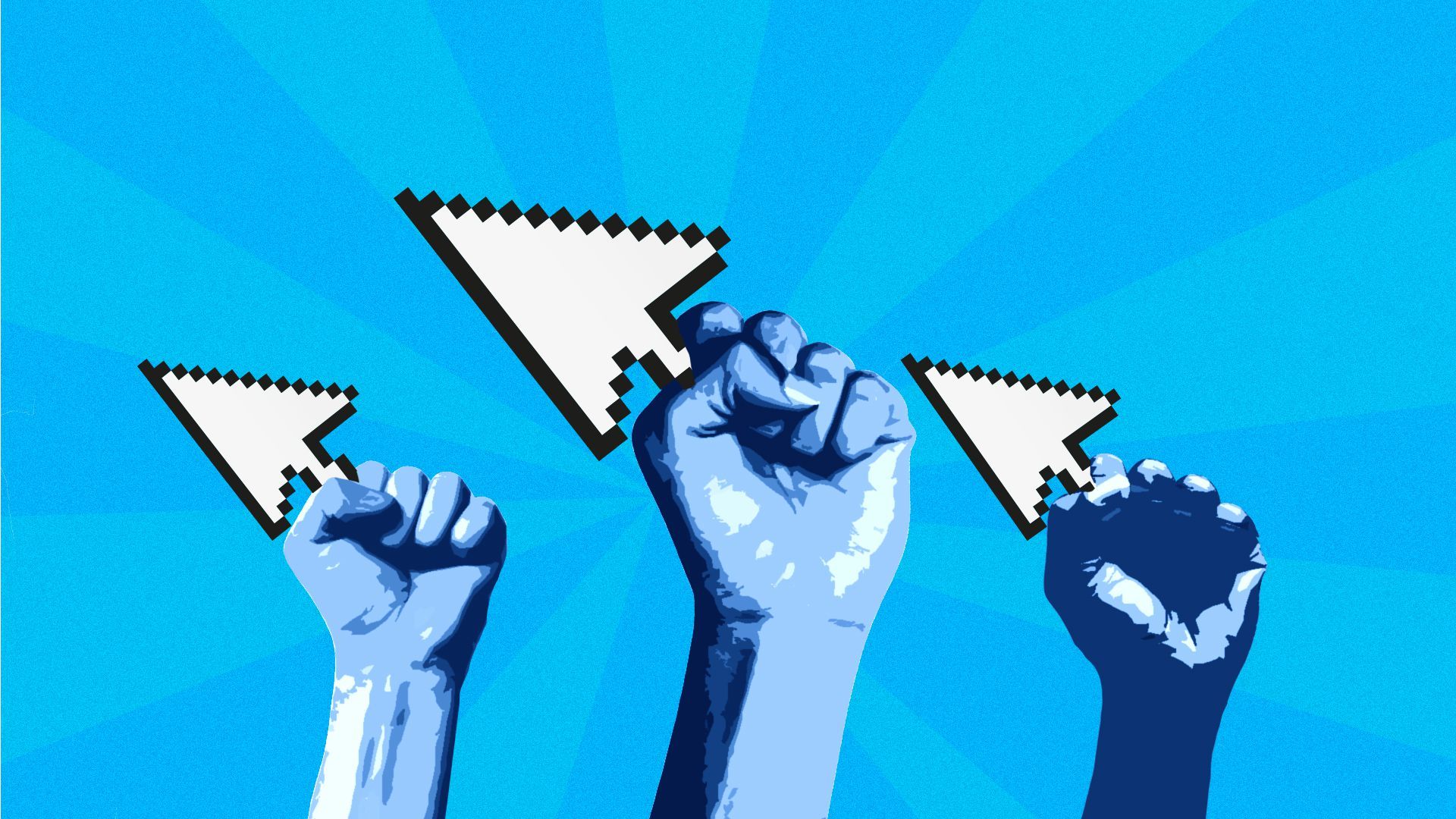Tech's Black Lives Matter branding hits reality bump
Add Axios as your preferred source to
see more of our stories on Google.

Illustration: Aïda Amer/Axios
Tech companies, like many other businesses, are taking public stands against police violence and systemic racism, but their actions often fail to back up those stances, as critics and some employees have been quick to point out.
The big picture: Tech firms stand accused of contributing to the very problems being spotlighted by the nationwide protests they now vocally back. In many cases, the industry still hasn't reckoned with the way its products and services have deepened racial divides, or with its own failure to diversify.
Driving the news: Last weekend, Amazon CEO Jeff Bezos took to Instagram to share emails from users angry that the company has emblazoned its front page with a Black Lives Matter banner.
- "You're the kind of customer I'm happy to lose," Bezos told one man whose hateful message included several uses of the n-word. Amazon has also pledged to donate $10 million to organizations fighting systemic racism that harms black Americans.
Yes, but: Amazon also has deals with hundreds of law enforcement agencies to share footage from people's Ring cameras, and, as The Intercept notes, sells facial recognition software to police.
- Critics argue that both tools are used in police tactics that disproportionately target black people, and a large and growing body of evidence suggests facial recognition software is more likely to misidentify people of color.
- Amazon has also taken fire for harsh working conditions at its warehouses, long home to a disproportionate segment of its black workers, and for targeting labor organizers.
Facebook is giving $10 million to groups championing social justice, CEO Mark Zuckerberg said last week, in a post where he acknowledged that "Facebook also has more work to do to keep people safe and ensure our systems don't amplify bias."
- But civil rights groups came away frustrated by a meeting with Zuckerberg after Facebook declined to take down President Trump's "when the looting starts, the shooting starts" message.
- Facebook has long drawn criticism that it has provided a global forum for racists to gather and spread their messages, sometimes in secret private groups.
- It has also faced charges that it let advertisers discriminate against black people and other minorities with housing ads shown to some groups and not others.
- Facebook was a central tool used by Russian agents in a campaign to manipulate the 2016 U.S. presidential election by, in part, sowing racial discord, as reports by the Senate Intelligence Committee found.
- A black Facebook employee in 2018 wrote and shared a memo company-wide, shortly before leaving the company, charging that "Disenfranchisement of black people on the platform mirrors the marginalization of its black employees."
Nextdoor, the neighborhood bulletin board platform, has put out a statement endorsing the Black Lives Matter movement.
- Nextdoor has been promoting the story of Shawn Dromgoole, a black Nashville resident who posted on the service that he was afraid of becoming the target of racist violence while walking along in his neighborhood and got responses from dozens of neighbors saying they'd walk with him.
- But in many neighborhoods around the country, the site has long been rife with posts from white users alerting one another every time they see an unfamiliar black person. The Verge dubbed the issue Nextdoor's "Karen problem."
- BuzzFeed recently reported that some users said Nextdoor appeared to be censoring their pro-Black Lives Matter posts. A Nextdoor spokesperson told Axios that users who think their posts were wrongly taken down should "report the matter to Nextdoor’s Neighborhood Operations Support team so we may investigate and restore, as appropriate."
Google, Twitter, Reddit and Airbnb are among the other companies that have endorsed Black Lives Matter and committed to anti-racism — in some cases with six- to eight-figure donations to match — but have been criticized in the past for providing platforms for racist language and actions.
The other side: Tech has also been indispensable to the 21st-century fight against racism.
- Smartphones have allowed people to document police violence against black Americans, and the internet has spread that footage widely.
- Social media has been a crucial organizing tool for rallying support behind the Black Lives Matter movement.
- And tech companies say they've made strides on combating racist content. YouTube launched a major crackdown on problematic videos and accounts last year after expanding its policies against hate speech.
Of note: IBM on Monday said it will no longer offer facial recognition software, citing concerns over mass surveillance and racial profiling.
Our thought bubble: Wielding Black Lives Matter branding as a talisman against criticism won't satisfy protesters calling to dismantle racist structures at the center of American society.
